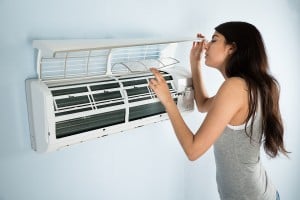Summer is in full force and the temperatures are soaring here in southern Oregon. As landlords or property managers we know that when the seasons change, whether it’s that first cold snap in the fall or the beginning of the hot summer months this is the most prevalent time for calls regarding malfunctioning heating and air conditioning systems. The calls are coming in with complaints of a/c units that aren’t keeping up with these hotter temps. Sometimes I wish the properties I owned didn’t come equipped with HVAC systems and either had no a/c or a cheap window unit. The cost of repairing or replacing these systems can be quite high, which is why I opt for hiring a local furnace and ac specialists to get them fixed rather than purchasing a new one which will set me back a few hundred dollars. Don’t get me wrong I want my tenants to be happy and comfortable but there are legalities when it comes to having heating and cooling repaired.
It’s the law that landlords repair the primary heating and air conditioning system and major appliances at a rental property in a timely manner. If a landlord fails to do so they are breaking the lease agreement. If the landlord is taking all reasonable steps to try and get a repairman to come fix the problem then that is generally all that is required. It’s out of the landlords hands if the repairman has jobs ahead of yours or if a part needs to be ordered to make the repairs. In my home state of Oregon the law states that if the landlord “deliberately or negligently” fails to supply tenants with these essential services, the tenant can choose to remedy the situation themselves. If the landlord is attempting to have the repairs completed, the following options are not available to the tenant. If the landlord has not taken the appropriate steps to have repairs made a tenant can choose one of the remedies below.
1.The tenant can stay at a motel and deduct the amount that rent costs/day from the motel bill
2. The tenant can sue for diminished rental value
3. The tenant can rent an a/c or heating unit and deduct the cost from the rent.
4.The tenant can file a five day Health and Safety Noncompliance notice and if the landlord doesn’t have a solution for the problem within five days the tenant has the right to terminate the lease agreement, move out, and get their deposit back.
5. The tenant can give the landlord written notice that they are having the repairs done by a licensed and insured contractor IF the repair is less than one-half of one month’s rent or $300.00, whichever is greater.
My advice in a situation where heating and a/c is involved is to be sure to document your attempts to have repairs made and always keep excellent records. If a tenant comes back later and tries to sue for compensation or negligence on the behalf of the landlord you have proof that you took the correct steps to remedy the situation.







I would do like I do with appliances. I tell them “I’m not sure if the central air (washer, dryer, whatever) works, but it’s there if you want to try it. I do not guarantee it works, and if it dies or malfunctions, it would be up to you to pay for repair or replacement”. I try not to be on the hook for some things; if a central air unit died, it could about eat your profits for the year….. I did have a tenant with the washer situation above, they told me it quit spinning, and asked if i had any suggestion of what they could try…. Based on the age of the washer, and the long good history of the tenant, I told them it probably wasn’t worth fixing, and I bought a used one for them. $200 to keep a good tenant…. (PS, it is clearly spelled out in my lease as well, including any appliances, drapes, ceiling fans, etc … I also keep pix (of condition and all non-real estate included) in a file on my computer. I need to start including LIGHT BULBS and a ROLL OF TOILET PAPER… they never leave any!! 🙂
It sounds like you have yourself covered Bonnie. Thanks for your comment, and why do they always take the toilet paper??
Great article! The challenges of maintaining HVAC systems during peak seasons are all too real, especially with the rising temperatures. I appreciate how you’ve highlighted both the landlord’s legal responsibilities and the tenant’s rights in these situations—it’s a balanced approach that many might not be aware of. The specific remedies available to tenants in Oregon are fascinating, and I wonder how these compare to other states’ laws. Do you think proactive maintenance schedules or tenant communication during off-peak times could reduce some of these urgent repair scenarios? Thanks for sharing these insights!